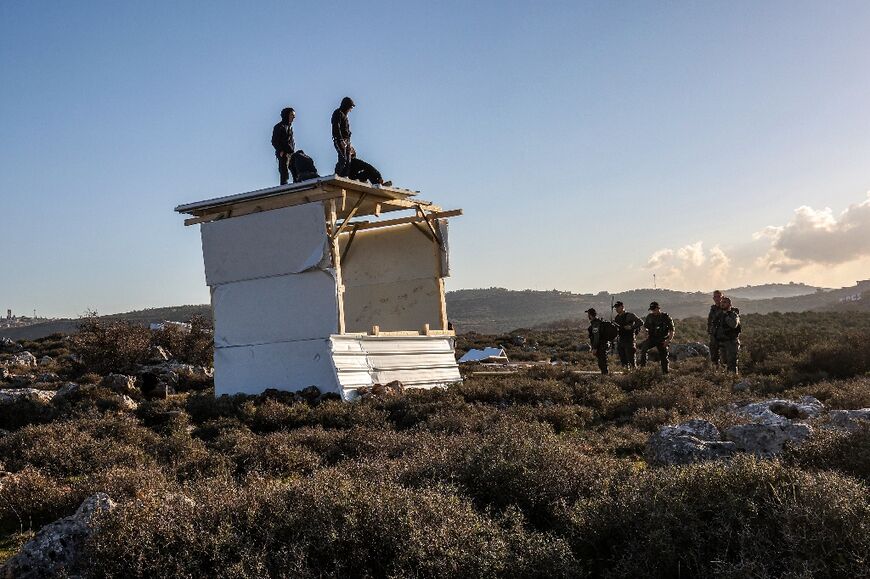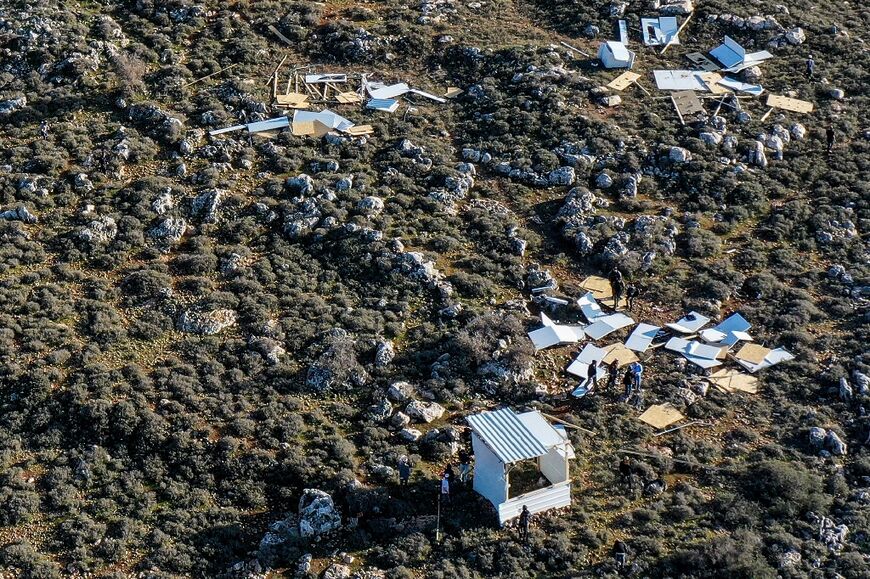Row over West Bank outpost exposes Israel cabinet split

Cracks have emerged within Israeli Prime Minister Benjamin Netanyahu's hardline government, with a row over the demolition of a settlement outpost in the occupied West Bank testing the fledgling coalition.
Netanyahu vowed in December to expand settlements across the West Bank, as he returned to power at the helm of the most right-wing government in Israeli history.
But a split over policy on the ground surfaced last month, when Israeli troops moved in to dismantle a wildcat outpost in the northern West Bank dubbed Or Haim on orders from Defence Minister Yoav Gallant.
Despite such outposts being considered illegal by the state, two far-right members of the cabinet, Finance Minister Bezalel Smotrich and Public Security Minister Itamar Ben-Gvir, objected to its demolition.
"There won't be one law for the Arabs and another for the Jews... law is law!" said Ben-Gvir, calling for the demolition of unauthorised Palestinian construction in the largest part of the West Bank where Israel exercises civil as well as security control.
Ben-Gvir has authority over border police operating in the West Bank, while Smotrich has taken on an additional role overseeing civil affairs in the Palestinian territory.
Netanyahu backed Gallant over the outpost affair, saying settlements must be "coordinated in advance with the prime minister and security officials, which was not done in this case".
While the Or Haim outpost consisted of just a handful of makeshift structures, the handling of its demolition hints at problems within the coalition.
- 'Very dangerous' -
Gideon Rahat, senior fellow at the Israel Democracy Institute, said the situation has "very dangerous potential for the state of Israel".
"It's not normal to have two people that have parallel responsibilities when it comes to the use of force," he told AFP, with Smotrich sitting in the second ministerial post created in the defence ministry.
Smotrich boycotted a cabinet meeting in protest over the handling over the affair.
Israeli soldiers returned to the Or Haim site two days after the initial evacuation, to expel settlers attempting to rebuild in the area.
"While this seems like a small conflict that was resolved, it shouldn't be there in the first place," said Rahat.
The issue is bound to resurface because there are dozens of similar outposts dotted across the West Bank, which Israel has occupied since the Six-Day War of 1967.
All settlements in occupied territory are deemed illegal under international law, but Israel distinguishes between wildcat outposts, built without its permission, and state-approved settlements which are home to an estimated 475,000 Israelis.
At the Maoz Esther outpost, northwest of Ramallah, a 20-year-old resident said she hoped Smotrich will "take all of his ideals and implement them".
"The fact that there is a right-wing government is good, but there are a lot of influences from outside," said Emona, who requested her surname be withheld for personal reasons.
Construction at Maoz Esther began more than a decade ago, according to Israeli anti-settlement movement Peace Now, and the outpost has been cleared and rebuilt repeatedly.
For Emmanuel Navon, a politics professor at Tel Aviv University, Smotrich's decision to skip the cabinet meeting was intended to "show his constituents that he cares about his agenda".
- 'Hit the jackpot' -
But he expected Netanyahu not to be swayed by his extreme-right allies.
The prime minister will "focus on settlement expansion, not too much, not too little. He's always playing his game of equilibrium between international pressure and domestic pressure."
The dispute is unlikely to bring down the coalition, because both the premier and his cabinet ministers, Smotrich included, are determined to stay in power.
Netanyahu's "not going to let go, because of his legal troubles. They're not going to let go because they hit the jackpot" by entering government, Navon said.
The prime minister has been on trial for months on corruption charges, which he denies.
At another settlement outpost in the northern West Bank, resident Itamar Azulai was against Smotrich's support for Or Haim.
"I think it was a mistake to build it from the beginning," said the 60-year-old, running a cafe at the Har Gidon outpost near Nablus.
Unlike Or Haim, Har Gidon receives the same municipal services as state-approved settlements, although Israeli authorities did not immediately confirm whether that means it has been given retroactive approval.
For Azulai, the fervent support for settlements from the Netanyahu government means there should no longer be any need for outposts.
"They will try to push that the big settlements will become legal, not the small ones," he said, flipping burgers on a grill.
"Now with the new government it needs to be done properly, not overnight."







